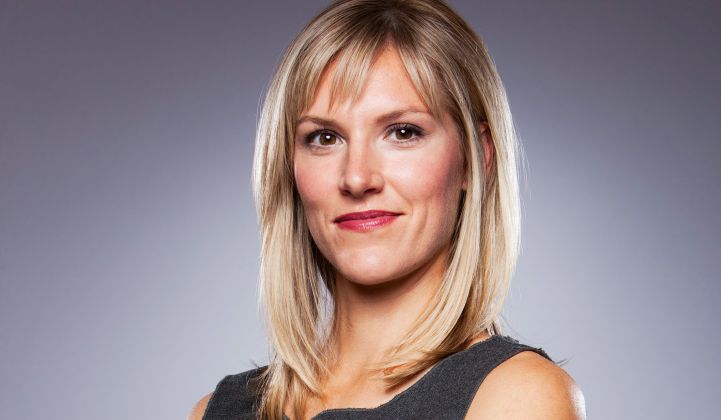After concern that stay-at-home orders and economic recession would hobble the U.S. rooftop solar industry, the nation’s largest residential installer took a hit in Q2 — but not a huge one.
Sunrun hustled to convert its sales efforts to remote and digital methods in the early days of the coronavirus pandemic. After making the switch, it found 10,700 new customers in the second quarter and installed 78.1 megawatts of solar capacity — its lowest numbers since the first quarter of 2018.
Second-quarter installations fell 20 percent compared to the largely pre-pandemic previous quarter, and fell 24 percent from the 103 megawatts installed in the second quarter of 2019. An uptick in activity after the initial lockdown period — including an all-time high for single-day orders in April — was not able to overcome the broader headwinds, such as social-distancing mandates that kept installers from entering homes and city and county permitting office slowdowns that prevented projects from being approved and interconnected.
But it also showed that the unprecedented disruption did little to alter the fundamentals of the business, in contrast to its disastrous effects for fracking companies and oil companies, or many local and regional solar installers that are more reliant on door-to-door sales.
“What drove the lower installs in the quarter was not [a lack of] customer interest,” CEO Lynn Jurich said in an interview Monday. “It was that we were restricted from selling in many places and installing in many places.”
Sunrun’s stock surged after the early July announcement of plans to acquire its top competitor, Vivint Solar, in a deal that will reshape the residential solar sector. In recent days, investors have pushed Sunrun shares to all-time highs. After starting the year around $14, the stock closed Monday above $47.
“It was undervalued for a long time,” Jurich opined on Sunrun's share price. "This is a decades-long opportunity.”
Installations should be 20 percent higher in Q3 than in Q2, Jurich added, and heading toward normal levels by the end of the year. But it’s still not clear whether gains in the second half of 2020 will allow Sunrun to beat its 2019 performance.
Sunrun building capacity amid a slowdown
Much of the residential solar industry had to scramble to digitize sales when face-to-face contact became untenable.
“A lot of these operating initiatives that were on our roadmap, we were forced to accelerate them,” Jurich said. “We’re leaner going into 2021, or whenever the world gets back to normal.”
Rival rooftop installer Tesla stood out as the lone company that had pivoted to entirely digital sales before the pandemic hit. But Tesla nonetheless saw Q2 installations drop 23 percent compared to Q1; Sunrun’s fell by only 20 percent, even with the switch of its sales strategies.
Sunrun also used the quarter to build up its roster of grid services contracts, in which it networks home battery systems into a “virtual power plant.” Three Bay Area community-choice aggregators signed up at the end of July to provide their customers emissions-free backup power, and Sunrun finalized programs with utilities Southern California Edison and New York’s Rockland & Orange in June, bringing its tally to 10 grid services projects.
Still proving out the grid services opportunity
The experimental nature of some of those grid services agreements suggests there’s work to be done to prove their broader commercial viability.
Sunrun hopes to sign up 300 existing customers in SCE territory and pay them $250 to participate in a year-long trial. Sunrun will dispatch the home batteries based on signals from the utility, reducing a household’s load or even exporting electrons to the grid as needed.
The SCE project is designed to test crucial questions on the distributed grid vision, such as what kind of compensation customers want, what tradeoffs they face when their batteries respond to utility commands, and how effectively the distributed equipment performs compared to other grid infrastructure.
“The technology works," Jurich said. "The issue is the market structures aren’t there to compensate the value that batteries bring.”
After several years of building up its grid services business, Sunrun turned to startup AutoGrid for software to control the fleet of distributed batteries rather than sourcing that competency entirely in-house. That lets Sunrun focus on its real value-add of managing the customer relationship, Jurich said.
“We enroll the customer, we communicate all the information to the customer and the utility, and then we use AutoGrid for the software layer,” she said. “We did think that was the fastest way to scale it.”
Though Vivint has admitted to being “behind on storage” relative to peers such as Sunrun, the acquisition by Sunrun could still accelerate the battery business thanks to Vivint’s strength with direct-to-home sales.
“You can really target the areas where the utility wants the virtual power plant resources,” Jurich said. That approach could let Sunrun concentrate sales on the distribution grid feeders where flexible capacity would be most valuable to a utility.
Sunrun did not reveal updated numbers on the share of customers adding energy storage as it has in previous quarters. But Jurich said that battery attachments are trending higher and will likely accelerate in the second half of the year as battery costs fall.




